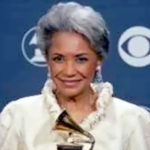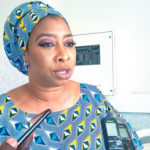You were introduced as the youngest parliamentarian at ‘The Convergence’, a three-day conference that was recently held in Abuja. What inspired you to go into politics as a woman at the young age of 22?
First, I have always had a passion to lead. But the fact is that I didn’t know it would be that soon until I decided to take up the challenge and realized that the time was now for me to contest. It was actually very challenging making that decision, looking at the kind of perception we have in our society. But I told myself that, first of all, we need to include the young ones and somebody has to get there to play that perception and I believe in the next election, Ghana will experience more young people running for positions because of the fact that some of us have been able to go there and it has inspired others to aspire more and challenge themselves to take up the task.
Buhari, Aisha and confusing orchestra
Ghana shares some similarities with Nigeria in many areas, especially politics. While speaking at the opening ceremony of ‘The Convergence’, you said you have been in this country six times within a very short period of time, did you notice any difference between how politics is played here and in your country?
The political systems in both are quite similar. However, it is just that in Ghana, with our constitution, you can run for parliamentary election at the age of 21 years, which is different from what operates in Nigeria; that is the only difference. And when it comes to violence in our political systems, we also experience similar incidences in Ghana. But during the 2016 elections, I must say that Ghana moved away from that as the exercise was a very peaceful one. So far, the 2016 elections in Ghana has been the most peaceful election and that must have been because we concentrated more on the use of technology.
In Ghana now, we do biometric elections: you need to be verified through the use of your thumbprint. It is not just about photo identification; your thumbprint or your index finger needs to be taken to be sure that you are the actual person who registered to vote. Aside that, most of the political parties also develop their own software where they can collate election before the Electoral Commission does. So, even before the Electoral Commission announces that you are the winner, you already know the figures.
Taking my own election for an example, we voted on the 7th of December 2016 and after the election, because of the system I had put in place, I could know the number of votes I got and the number of votes the president got within about four hours after election. Right from there,
I moved to my constituency’s Electoral Commission collation centre to be sure that the figures corresponded with what the Electoral Commission was also compiling and I think that was key. All these were done using technology.
Were you able to find out if the figures correspond?
Yes, they did. There was actually one polling station in my constituency where there was over-voting with two votes. I had to push for a cancellation and that polling station’s election was cancelled.
Just because of two votes?
Yes, it was over-voting. In an election you can’t have a 100 per cent of people showing up. So, if they have, say like 800 voters and you count 802 votes, then there is a problem and ideally you cannot have a 100 per cent turnout of voters. So, the use of technology is key and I think that is something that the Independent National Electoral Commission (INEC) here in Nigeria should look into because that is one thing that has helped us a lot to have a more stable results and situation during our 2016 elections in Ghana.
What were challenges you faced while running for office as a 22-year-old young woman?
It was a very challenging one as a young person, at the age of 22 years, trying to solicit for money from people to support your campaign and all that. I had challenge from my party as well because my party, the New Patriotic Party (NPP), which is currently the ruling party in my country, is an elite party. Most of the people in the party are established professionals, like lawyers and so on. Being elitist party that means the members are conservative and they always want to stick to the principles by which the party was established. I must say that, at a point, they even wanted to disqualify me, but considering the fact that they looked through every detail and realised there was nothing they could hold against me, they had to back me. It was not easy and I was not somebody who has a political godfather and, like most of the politicians you have here, it was challenging getting somebody to stand up for you.
However, I think one thing I had going for me was that I got most of the youths to back me. So, a lot of people paid more attention to my election during the primaries. People were certain not to do something that would get the public to start asking questions like ‘why did they disqualify her when everything was in order’? The public attention was drawn on my campaign as a result of branding which was key. You have to brand yourself so that people will begin to appreciate you and begin to see themselves within you.
Women in Nigeria shy away from politics because of some unpleasant factors like intimidation, harassment and all that. Did you also experience any or some of these during your campaigns?
Yes, I did and I still do, actually. Sexual harassment is an issue, not just in Africa, but a global issue. You hear women complaining of sexual harassment in different parts of the world. I actually experienced it not too long ago and I complained to the necessary body and they are looking into it. It is very challenging, but as a woman I think one should be able to overcome it.
The mere fact that you are in need of something, the mere fact that you are facing a challenge that is way above you should not let you give in so easily. It is challenging, especially in our part of the world where sometimes people don’t appreciate what sexual harassment is, they think it is something common. But when you go to the US or the UK, they pay particular attention to this issue. You must have, at various times, heard of cases of some politicians who had conducted themselves in a bad way in the past and when the issue comes out, people will count that against them and would not vote for them. But in our part of the world, some people might even start blaming the woman.
That is of the reason I have thought that, may be in my next term, I am probably going to focus on issues like that. For now, I am focusing on youth development. Fortunately for me, the current president in Ghana made me the board chairman for the National Youths Authority, which is under the Ministry of Youths and Sports. What we do there is instilling spirit of patriotism in our youths; build their capacities and things like that. So far, I have been able to train about 30,000 youths in ICT because I believe in ICT and about 1000 of them have been employed by various banks in Ghana.
The perception here in Nigeria is that many of the politicians make election a do-or-die affair because of the attraction of money for elective public offices. What does the pay and perks of political offices look like in Ghana?
In Ghana, we also have a similar perception that people have about politicians. I was talking with somebody recently about the salaries of members of House of Representatives and of the Senate here in Nigeria. When he mentioned it, I thought it is very high because in Ghana we are taking just a bit above $2,000, which is comparatively low, considering what operates in some other countries. But that is a perception.
One thing about this job is that you tend to spend more when you are in office because you will always have to help people who are coming with their requests: school fees, hospital bills, light bills and so on. I don’t know how your system is here, may be people come around with such requests, but in Ghana, we see and experience a lot of that. The monetisation of our systems is rather unfortunate. I think it is something we should critically look into as a continent and see how to resolve some of these things.






